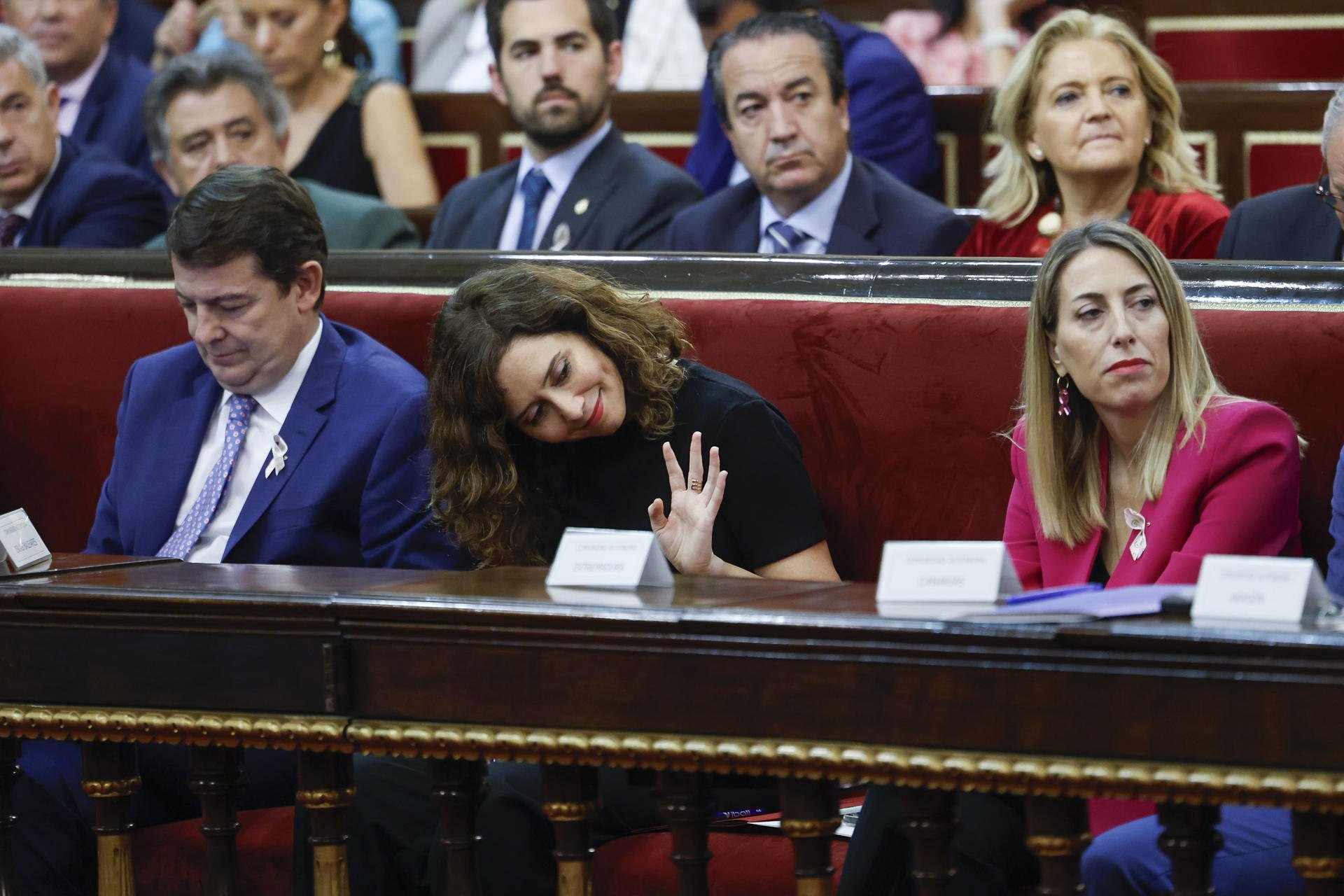The old chamber of the Spanish Senate resounded like a polyphonic choir this Thursday as the People's Party (PP) sang out different versions of the same strident music against the amnesty that the Socialists (PSOE) are negotiating with the Catalan pro-independence parties to enable the investiture of Pedro Sánchez as head of a new Spanish government. In this scenario, with the blue of the PP predominating since many political opponents boycotted the committee session, the Spanish conservative party's twelve autonomous community presidents acted chorally to score points against the acting Spanish prime minister as well as the Catalan president, Pere Aragonès, who spoke first, defending the amnesty and the independence referendum, before leaving the Senate's General Committee on the Autonomous Communities to debate without him.
From Galicia to the Balearic Islands, passing through the Valencian Country, Aragon and Andalusia, the Spanish territorial barons of the PP lashed out against an "infamous transaction" that will enable the pro-independence parties to "jump the law" for the benefit of Pedro Sánchez, whom they defined as an "egotist" who did not dare set foot in the Senate. One of the most powerful critiques came from the Balearic Islands leader Marga Prohens, who denounced the "special treatment" given to the pro-independence parties, Republican Left (ERC) and Together for Catalonia (Junts), in return for their agreement to vote in favour of Sánchez's investiture, a process which, she said, has become "an auction".
"We're not talking about forgiving people, but we're talking about asking them for forgiveness", said Prohens, demanding that needs be addressed in spaces shared by all the autonomous communities, and "not in Waterloo" - the capital of Catalan exile. The Balearic president, who used both Catalan and Spanish in her speech, said that she "respects" Catalonia, although she has opted to relate to it "without giving lessons or being complexed", and at the same time, she defended her own government's offensive against Catalan in the Islands, arguing that languages cannot be a tool of "confrontation" with "partisan" purposes, but must be a way of "communication, dialogue and wealth".
Prohens' diagnosis was shared by her Valencian counterpart, Carlos Mazón, who denied the existence of the Països Catalans - the Catalan-speaking countries - which Pere Aragonès had referred to in his speech. "It's not just a dream, but a nonsense and an insult", said the Valencian, who defined the proposed amnesty for independence process prosecutions as an "attack on the state of the autonomous communities" which is being negotiated "behind the backs" of the majority of Spaniards. For Mazón, who called for an improvement in the water deficit and in the autonomous financing system in a speech mostly in Spanish, the negotiations with Junts and ERC respond to the "vanity" of the acting Spanish PM. The message sent by the PP is that all the claims of the autonomous communities are legitimate, but they must be resolved in the regional forums, and not in "dark" bilateral relations between Catalonia and the Spanish state. Pere Aragonès was criticized for the "discourtesy" of not staying to listen to the opinion of the other regional leaders.
Ayuso's extremism: "Soon there will be no Spaniards"
Thus, the triumphal parade of the PP barons turned into a list of grievances that, in their view, are caused by the legislative programme of Spain's current progressive government, supported by pacts with the pro-independence forces. The argument is that, since Sánchez is subservient to the "privileges of a minority", the general interests of the rest of the communities, which feel ignored, cannot be taken care of. The choral monologue was completed by the contribution of the president of the Community of Madrid, Isabel Díaz Ayuso, who hit the harshest notes of the day.
In her eyes, the amnesty law represents "the greatest betrayal" of Spain and she warned that if this "indignity" is approved, "soon there will be no Spaniards". In a catastrophic speech in which she accused Sánchez and the PSOE of auctioning off general interests, Ayuso predicted that, after the amnesty, the pro-independence parties will claim independence, "the imposition of a totalitarian regime", the reclamation of the Catalan-speaking countries and the accession of territories from Aragon and France.

